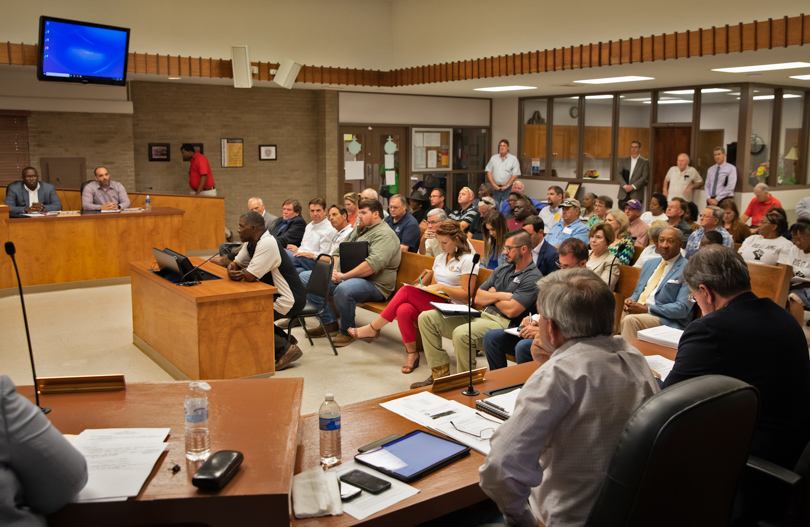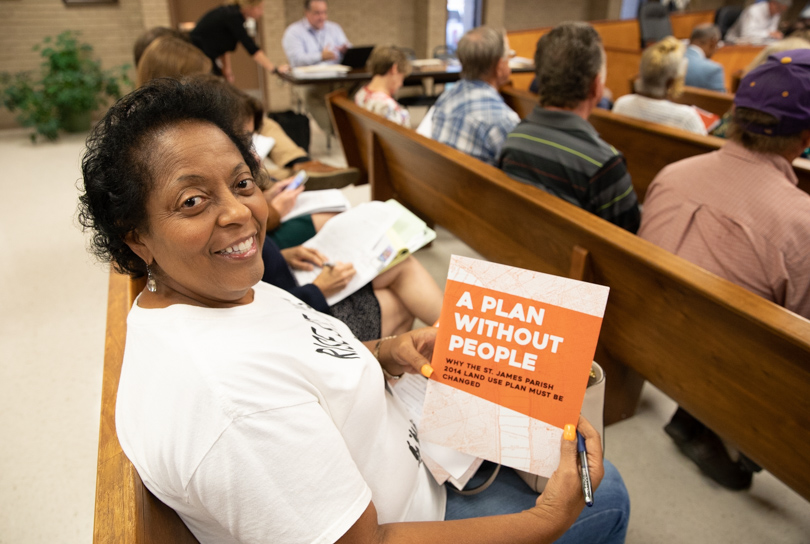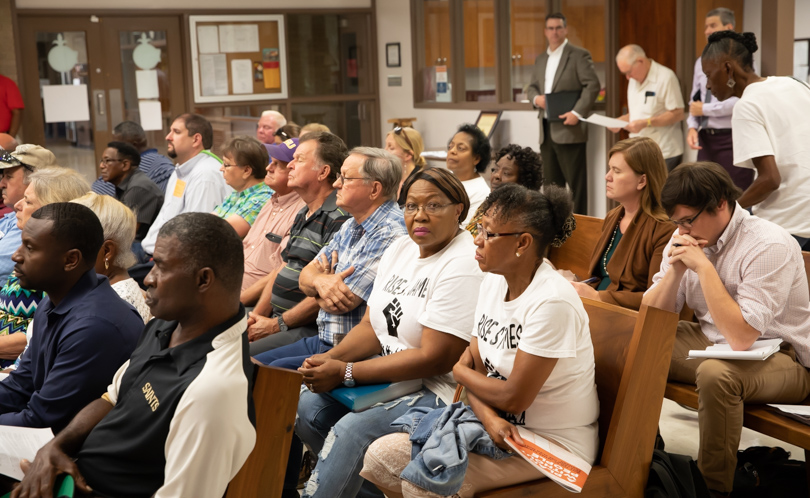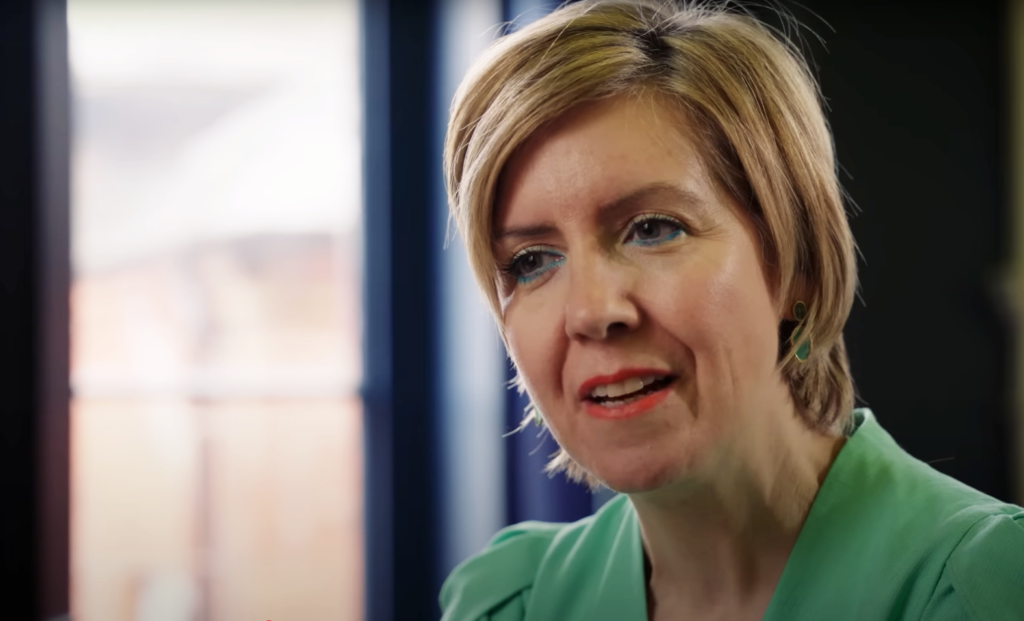“Look at what is coming into the Parish, instead of saying ‘Yeah, yeah, yeah’—it is time to say ‘No,’” Pastor Harry Joseph told the St. James Parish Council on July 24. He implored councilmembers to consider freshly unveiled public health and economic concerns before they reaffirmed a permit allowing yet another petrochemical plant in a southern Louisiana community fed up with its already rapid industrialization.
Joseph, pastor of Mount Triumph Baptist Church in St. James, is one of the plaintiffs appealing the parish council’s permit granted May 20 to Wanhua Chemical, which is planning to build a $1.25 billion plastics factory on the banks of the Mississippi River. During the appeal, new information about the project caused the council to halt a vote on repealing the permit. Instead, it sent the matter back for reconsideration to the parish planning commission, which had previously granted the project permission.
Sharon Lavigne, founder of RISE St. James, holding a report by the Louisiana Bucket Brigade about a parish land use plan. RISE St. James and the Louisiana Bucket Brigade are plaintiffs in ongoing lawsuits led by the Tulane Environmental Law Clinic.
At the appeal hearing, the Tulane Environmental Law Clinic, representing Joseph, lifelong parish resident Genevieve Butler, and two environmental groups, RISE St. James and the Louisiana Bucket Brigade, argued against the sprawling complex. The clinic asserted that the project will emit chemicals that are much more dangerous than Wanhua let on, and stressed that the company’s controlling interest is held by the Chinese government, not the U.S.-owned company, as a representative from Wanhua Chemical U.S. Operations suggested.
Days before the permit appeal hearing, the law clinic discovered that Wanhua had applied to set up a free trade zone with the Port of South Louisiana. If that status is granted, the parish would lose its anticipated revenue from the massive plastics project.
A free trade zone “not only exempts the company from the 25 percent tariff, but also can exempt it from local inventory taxes and even sales tax collection,” according to Victor Franckiewicz, Jr., one of the parish’s attorneys, as reported by the Baton Rouge Advocate.
Wanhua was already set to get a 10 year, 100 percent property tax break under the state’s Industrial Tax Exemption Program, which has since been reformed.
These revelations led the council to decide that the parish planning commission needed to reconsider a key land use approval, which had played into the council’s original permit approval. The planning commission’s decisions weigh a project’s economic impact versus its environmental and other impacts, meaning the company’s recent free trade zone request could affect the commission’s original approval.
Wanhua’s Chinese Connections
During the council meeting, Jim Newport, general manager of Wanhua’s U.S. operations, denied that the company is Chinese-owned or that it has any ties to China’s Communist Party. But Kimberly Terrell, director of community outreach at the Tulane Environmental Law Clinic, countered his claims.
Terrell pointed out that Wanhua Chemical U.S. Operations LLC is registered as a “Foreign LLC” and its directors are all based in China. Furthermore, several of the directors are top officials at the Chinese-based parent company, Wanhua Chemical Group, and also have ties to China’s ruling Communist Party.
Questions of Tariffs and Taxes
The planning commission has yet to set a date to reconsider Wanhua’s land use request for its proposed 250-acre complex that, if built, will manufacture a component of polyurethane foam used in cars and furniture. The plant will release some 300 tons of toxic air emissions per year, including 1,700 pounds of phosgene — a colorless gas used in chemical warfare during World War I.
The Baton Rouge Advocate reported that before the land use application is taken up again by the planning commission, likely in late August, “the parish and Wanhua are working on an agreement in which the company will commit to pay the sales and inventory taxes that will include a waiver of any sovereign immunity.”
President’s Trump’s changes to tariff rules have helped put the U.S. chemical industry in a tailspin. Last year, the American Chemistry Council warned: “Nearly $185 billion in new chemical factories, expansions, and restarts of facilities around the country are predicated on current tariff schedules, and market shifts caused by tariff increases may convince investors to do business elsewhere.”
Kimberly Terrell with the Tulane Environmental Law Clinic talking with Victor Franckiewicz, Jr., one of the parish’s attorneys at the July 24 council meeting.
The fight to stop the Wanhua plant in St. James Parish is part of a growing resistance to these chemical and plastic industry plans, particularly as the industry seeks to expand its foothold along an 80-mile stretch of the Mississippi River, spanning from New Orleans to Baton Rouge. The area, which has earned the nickname “Cancer Alley,” already has a large number of petrochemical plants and refineries, often situated next to low-income, African-American communities. It is also part of a broader battle against the oil and gas industry, whose products feed plastic and petrochemical plants, worsening both climate change and plastic pollution.
Taking on the fossil fuel industry in Louisiana is an uphill battle. Most politicians, from the Democratic Governor on down, don’t accept mainstream climate science and welcome fossil fuel industry infrastructure projects, including pipelines, natural gas power plants, and the petrochemical plants fed by them. The Baton Rouge Advocate, the only statewide newspaper, has published editorials praising a slew of fossil fuel projects wanting to make Louisiana home.
Industry Workers vs. Community Members
During the July 24 council meeting, several people who work in the chemical industry urged the council to approve the project, telling its members how good the industry has been for their families. Pastor Joseph later reminded the council that none of those who spoke in favor of Wanhua live near the proposed site.
Packed parish council meeting with a mix of chemical industry workers and citizens concerned about the public health impacts of Wanhua’s proposed chemical plant.
“We stand again to let you know how people feel,” Pastor Joseph said in his opening remarks to the parish council at the July 24 meeting. “I think it is time for the council, the commissions, for everyone, to start listening to what the people are saying.”
His comments reinforced that the Tulane Environmental Law Clinic, which recently was attacked as “vigilantes” and outsiders by Steve Nosacka, the mayor of Gramercy, a town in St. James Parish, represents the will of the people who would be the petrochemical plant’s neighbors.
Pushback Against Tulane’s Environmental Law Clinic
Nosacka, a regular at parish permit hearings, speaks in favor of every petrochemical company that wants to build in the parish. At a May 15 permit appeal hearing over Syngas, a proposed methanol plant, Nosacka made pointed accusations against the law clinic that prompted Tulane’s Lisa Jordan to correct the record.
Pastor Joseph has been going to council meetings, regulatory permit hearings, and protests against the fossil fuel industry since 2017, when pushback began against the Bayou Bridge oil pipeline, which now crosses southern Louisiana from Texas and ends in St. James.
Losing the battle against that pipeline didn’t deter the community from fighting as more polluting industry tries to move into the Mississippi River parish. Instead, it helped lead to the formation of the Coalition Against Death Alley (CADA), a group of Louisiana-based residents and members of local and state organizations calling for a stop to the construction of new petrochemical plants and the passing of stricter health and environmental regulations on existing industry in the area.
The parish council’s decision to delay approving Wanhua’s plastic plant gives Pastor Joseph and his fellow opponents hope their efforts this time might be more successful.
Main image: Pastor Harry Joseph speaking at a St. James Parish Council meeting on July 24. Credit: All photos and videos by Julie Dermansky for DeSmog
Subscribe to our newsletter
Stay up to date with DeSmog news and alerts










